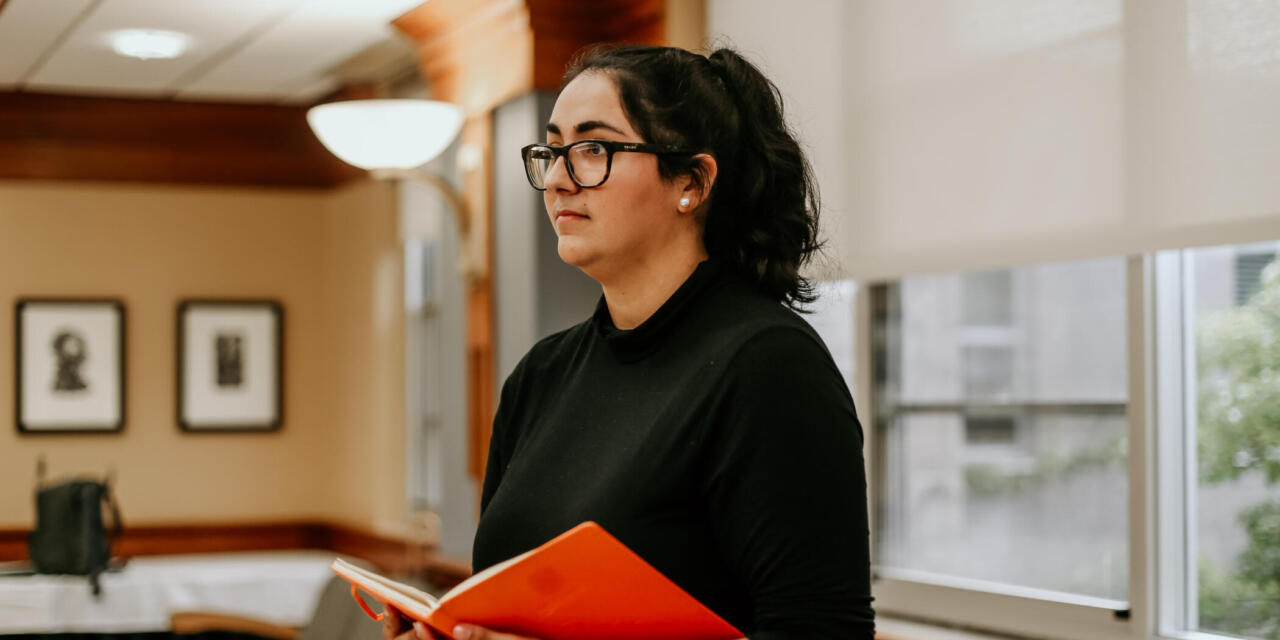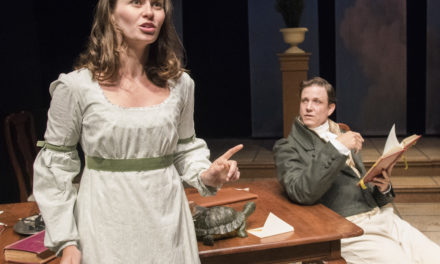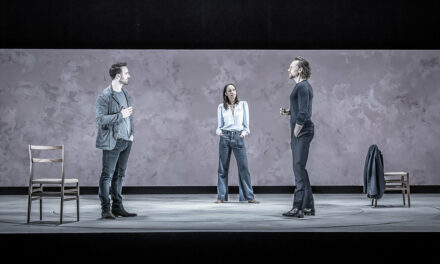The work of Thalia Ranjbar may be challenging– pushing beyond norms and expectations, but at its core it is kind. Her gentle, but relentless commitment to community can be felt both in the content of her work as a playwright, lyricist and librettist, as well as her process as a director and choreographer drawn to developing new work. With a thoughtful curiosity she uses theater to explore the critical questions of our moment: What do we need in order to learn how to live together? When do we celebrate our traditions, and when must we forge our own new paths? How do we approach rupture in our relationships (be they familial, communal, or societal) and find compassionate ways forward?
From the first original musical she worked on, a performance fundraiser entitled Stage A Breakthrough, Ranjbar has always prioritized creating spaces for honest, vulnerable collaboration. The piece, which she wrote book for and co-directed, was developed by gathering stories from friends, family, and community members about their experiences with mental health. Then Ranjbar, along with Sarah McMillan as co-creator, translated the stories into song, dance, and story for the stage. “It was a really community-driven, cathartic process,” said Ranjbar reflecting on the show which was staged at For Good Productions and went on to raise $20,000 for the Trauma Centre in Sharon, Ontario.
She has brought that spirit to her current work which has included making her Off-Broadway directing debut for Village Songs at The Rattlestick Playwrights Theater, participating in the prestigious Johnny Mercer Foundation Songwriters Project, contributing songs to the Broadway’s Future Songbook Series at Lincoln Center, and Work In Progress at 54 Below, and directing several works at the Emerging Artists Theatre including the upcoming Macha Book/Lyrics by Maria White, Music by Anna Marcus-Hecht and Echo by Ella Sodom Yoon and Deniz Demirkurt.

Shahryar Motia and Rozz Alizadeh Srabi in Unlikely Friends at Bloor St. Station as part of the Emerging Artists Theatre New Works Series
She also recently had a staged reading of her own new play, Unlikely Friends at Bloor St. Station which explored some of the recurring themes in her work: family, forgiveness, Persian culture, and “our universal longing for love and connection”. In the show strangers Babak, an Iranian immigrant, and Shams, a pregnant, second-generation Iranian, wait anxiously at a Toronto train station, unaware they are each waiting for the same person. As they discover their entangled experiences, they must confront difficult memories and help each other grapple with the strength and frailty of family.
This reading was especially exciting as it was an opportunity for Ranjbar to enact one of her goals for the theater world: moving beyond tokenism by ensuring diversity and cultural integrity are baked into the very DNA of a theater piece. Said Ranjbar, “It’s not just about having representation in terms of who’s onstage, we have to look at who’s making a piece? Who is making the decisions around it? Who is making the decisions around what gets to be onstage in the first place?” With Ranjbar as the playwright and director, Deniz Demirkurt as creative and logistic producer, and a cast of Persian actors, the team was able to delve deep into the cultural nuances they were exploring. “We got to have lots of conversations about shared experiences where certain things are just understood.”
“There are things in Persian culture that are perfect and flawless, and there are things that could stand to be challenged.” She went on. In particular Ranjbar is interested in the instruction that one must never question their elders or the powers that be– a topic that has gained new urgency in the context of the ongoing women-led protests in Iran. “I want to understand,” she says, “and I want to understand why I don’t understand. How did we get here? What was it like for my parents? My grandparents? Their grandparents?” At the same time, Ranjabar is protective, saying “There’s a power in telling our own stories, not letting the media drive the headlines.” It’s this willingness to live into complexity and messiness that makes her writing so compelling. Watching her work, one can feel that this is someone who sees the good in the world not out of mindless optimism, but because of a steady belief that in actively choosing to see the good we can find ways to cultivate goodness together.
She also brings this shared cultivation to directing new work saying, “Development is not about me, it’s about what we can learn together.” She favors a process-driven approach where there is space for creative possibilities, mistakes, and open communication. “I definitely prioritize the writers, I think because I’m also a writer.” she said. With the upcoming works she’s directing, Macha and Echo, she says she’s there to breathe life into the piece and reveal what’s on the page. From there she can work with the writers to determine their specific goals so they get what they need depending on where their project is in its process. “Artists can be sensitive,” she said, “We have to create spaces where we feel safe taking risks together.”
From her writing, to her directing, to her views on theater, and the world as a whole there’s something radical about Ranjbar’s commitment to kindness. It would be oversimplifying to say she just believes we should all get along. Rather, her work shows us that there is much to be gained from trying to understand one another, letting go of ego, not dropping each other when there’s conflict, not hiding from contradictions. It’s no easy task, but theater has always been a realm for experimenting with different ways of being. I’m grateful for artists like Ranjbar who encourage us with humor, spectacle, and care to take on the challenge.
This post was written by the author in their personal capacity.The opinions expressed in this article are the author’s own and do not reflect the view of The Theatre Times, their staff or collaborators.
This post was written by Morgan Skolnik.
The views expressed here belong to the author and do not necessarily reflect our views and opinions.



















